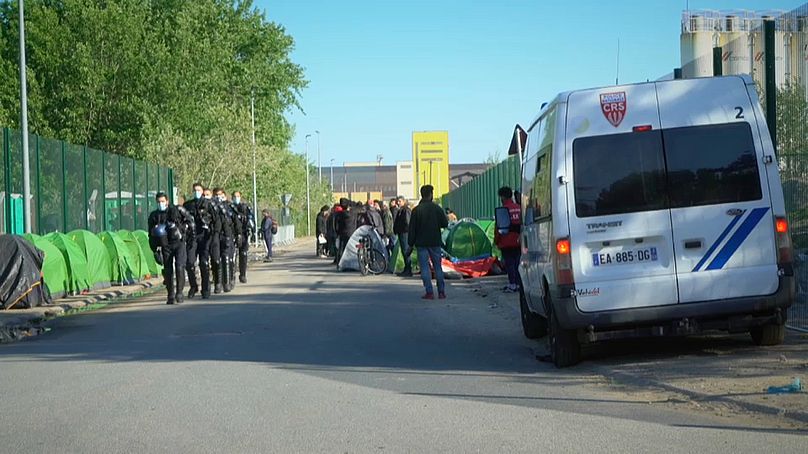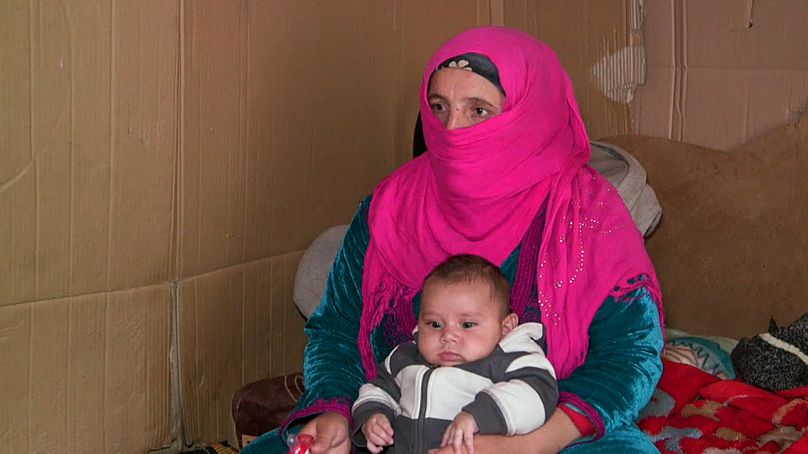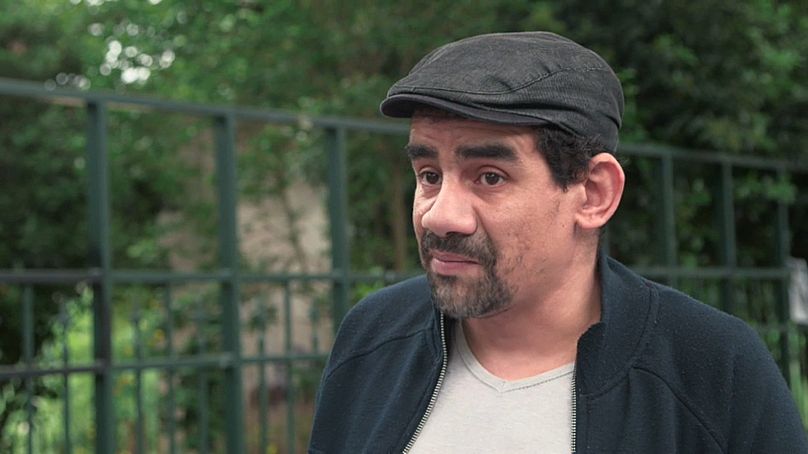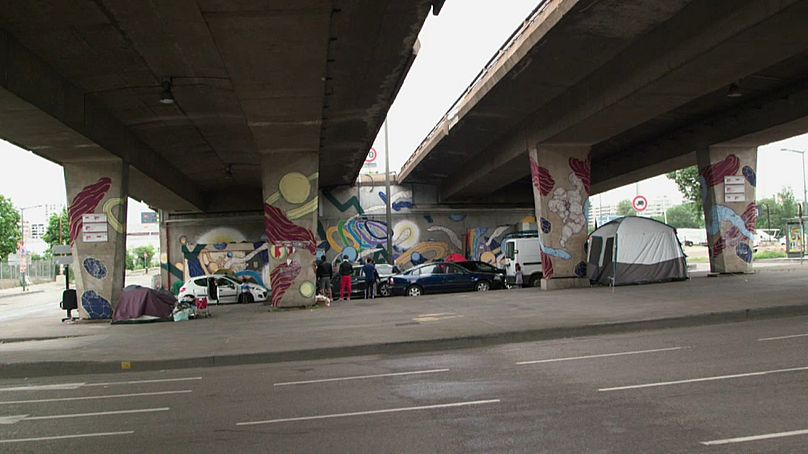In this episode of Unreported Europe, Euronews' Valerie Gauriat reports on the desperate plight of refugees, asylum seekers and migrants in France as the country emerges from lockdown.
In this episode of Unreported Europe, Euronews' Valerie Gauriat reports on the desperate plight of asylum seekers, migrants and homeless people in France as the country emerges from lockdown.
In the northern French port of Calais, police arrive to evict asylum seekers and migrants from their makeshift camps every other day. For now, the closing of national borders, due to COVID-19, has scuppered any hope for these people to leave France for a new life in the UK. But it is not just about the game of cat and mouse with the authorities, what has become clear for those living on the fringes of society in France, is that this health emergency has made their daily struggle for survival a lot harder.
Throughout France, charities have been forced to scale down aid following weeks of lockdown. Supporting the needs of an estimated thousand people in Calais has become a challenge.
"There's less of a presence in the camps - less services. So the conditions are getting worse. And from another side, those who are helping are prevented from doing so. We've had 26 fines for going out on patrol, delivering food, or blankets. And four members of the team were taken into custody, while carrying out humanitarian work," explains Antoine Nehr, a coordinator at the charity Utopia.
"They are not scared of the coronavirus."
Only a few NGOs are authorised to deliver food to asylum seekers in the area of Grande Synthe, a few kilometres away from Calais. Basic medical checks are carried out each day.
"Every vulnerable person or migrant gets their temperature taken by the civil protection teams. In case there's a problem, they report it, and take them to hospital, if needed. Until now, no COVID-19 cases have been spotted on this site, at least in the past two months," says Christian Hogard, from Secours Populaire, North Branch.
The appalling living conditions in which some 600 people live, affect them more, they insist, than the virus.
"The people aren’t afraid of coronavirus because they had lots of problems, they went through lots of dangerous things, that were worse than coronavirus. And they are here. They are not scared of the coronavirus," insists Dana Babaie, an asylum seeker.
From north to south
It is a similar picture in other parts of France. On the outskirts of Lyon, in the south east of the country, we find a slum where several families from Syria live in squalid conditions, in spite of the wider public health crisis.
Still pending refugee status, they are unable to find housing or work, and no longer receive any asylum seekers allowance. The only help they get is from a charity started by a few women during the lockdown and some local residents.
"Since the coronavirus started, nobody comes here anymore. We met Sofia and Nawel who come to help us. Our Arab brothers also come to help. We ask God and the French government to help us, to restore our benefits! As soon as they do this, we will leave immediately!" says Bahjat, an asylum seeker.
While nobody here has so far been infected with COVID-19, the sanitary conditions remain extremely unsafe.
"We found nothing else, we even tried to squat in a house, we stayed there four days, and the police evicted us. My husband searched everywhere without any luck, and in the end he built this place, so that I could give birth, and now we live here," says one woman.
The pandemic has only made the wait for answers to administrative procedures - undertaken with the help of Sofia and her team at Baraka Association - even longer. And with lockdown ending, the threat of eviction is looming.
"I fear the worst, I fear the worst for them because we've had no official answer at all. And in any case, when we do have answers, they're pretty negative. So if they are expelled from here, where will they go? What will happen to them? Where? We just don't know," says Sofia de los Rios, from Baraka Association.
"We have no drugs, we have no money...to buy gloves, or masks."
For the most deprived, access to care is a challenge. Even more so in a pandemic. Across the country mobile health teams have been deployed among the most vulnerable to prevent and detect COVID-19. We follow one of them to a disused garage that’s been transformed into a squat. Around 80 people, all Roma families, are living here.
“It’s a critical, critical problem, the virus. We have no drugs, we have no money to go to the pharmacy, to buy gloves, or masks," Harry tells us.
The community shares two toilets and a water hose.
While no case of coronavirus has been identified in the squat, health professionals fear the risk is never far away.
“We see patients with cardiovascular diseases, respiratory diseases. These are vulnerable health conditions that are potentially very serious in terms of COVID-19. The challenge is to identify these and get them taken care of properly. That’ll make it possible to stop the disease from spreading, and perhaps, save some beds in intensive care units. But the real question is: how do we properly take care of the most fragile, the homeless, and give them decent living conditions, to avoid problems we’re seeing? If we’d taken care of this before we’d probably have far fewer serious cases and better follow up.” insists Samuel Guevart, from Medecins du Monde.
"I will risk death, to find food for the children!"
Decent living conditions for the poor - it’s a plight which torments Kamel, who regularly helps a large family of Roma that have been living in cars in the heart of Lyon for several years.
"It's my dad, he's a 70-year-old man. He's in the car here. It's hard for him, because he's an old man, he's sick, says Marius, a member of the homeless family. He adds:"...look, this is my car. Six people sleep here, four children and two adults. "
Unable to find work, the family have survived by begging, which became next to impossible during the recent lockdown. It still remains a challenge - but they insist they have no alternative.
“There's no other solution! A man said to me, "Lady go away, there is the coronavirus!" But I will risk death, to find food for the children! It's so difficult, the coronavirus," Dorina tells us.
Kamel, a resident in Lyon, slams the authorities for the lack of action in helping the family.
"It is true that by staying confined here they are less likely to catch corona ... But beyond that, they have been living here for years! If I don't bring them food, or ask others to help, nobody moves, neither the government, nor the town hall, nor anyone at all. So what now? Will they have to stay here all their lives? "
Our day ends under a motorway bridge that leads into Lyon. Several families have been living in tents there for months. They say they can't take anymore.
One man tells us, "We've been on the streets looking for work, then the virus came, and that was the end of that,” adding later: “I just want to go back to Romania. "
“We can't go out to find work, we can't live! People are scared of us, they're avoiding us, and we avoid them, because of this virus," says another man. He finishes by telling us: "We need to find work...now we are just waiting for the borders to open, to go home. We can’t stay here any longer."
A wish that poverty and the sanitary crisis might compromise for some time to come.














